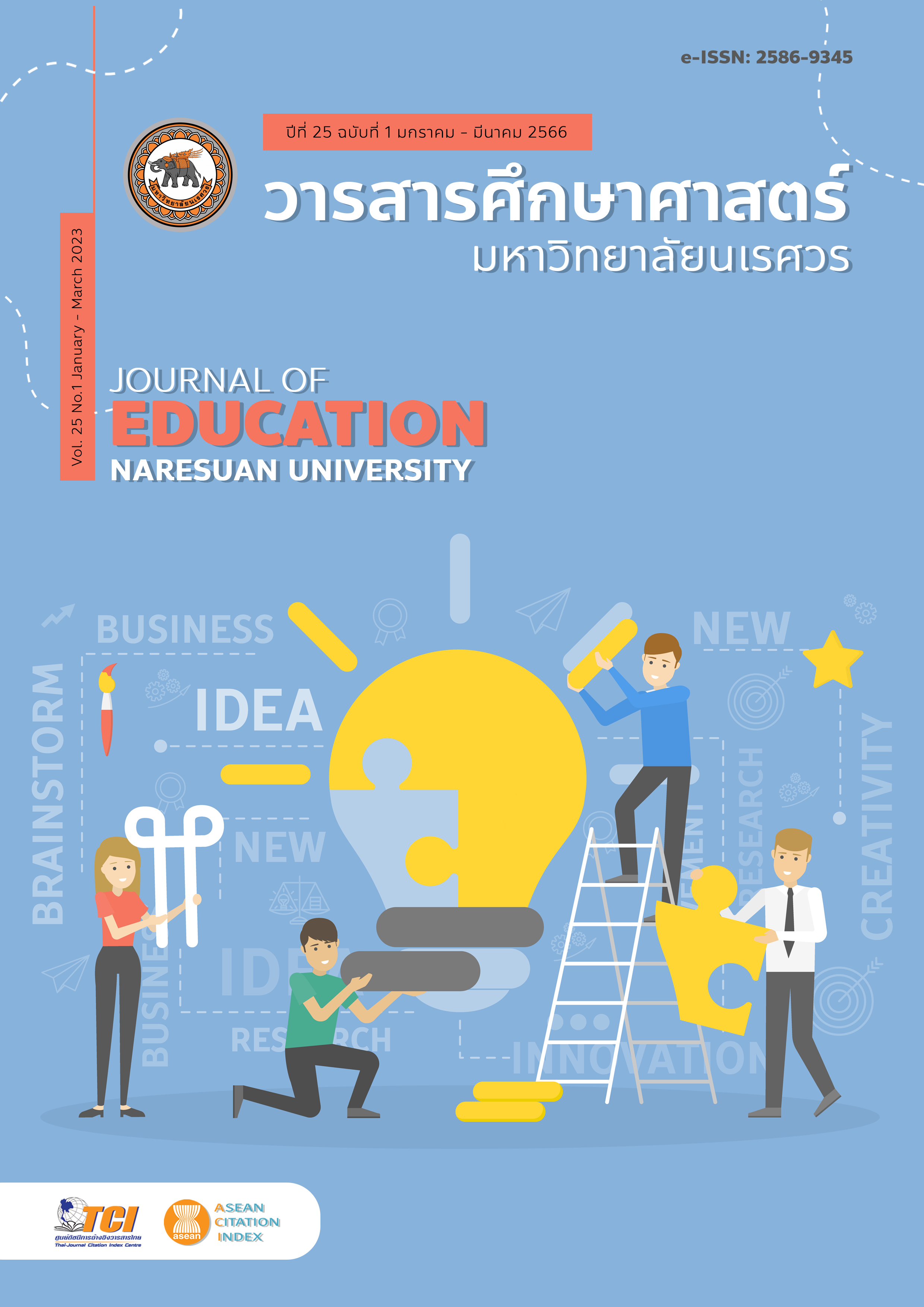THE EFFECT OF SYSTEMS THINKING LEARNING WITH UNIFIED MODEL ON BIOLOGY FOR GRADE 11 STUDENTS ผลการจัดการเรียนรู้โดยใช้วิธีการคิดเชิงระบบแบบยูนิฟายด์ วิชาชีววิทยา สำหรับนักเรียนชั้นมัธยมศึกษาปีที่ 5
Main Article Content
Abstract
The objectives of this research were 1) to develop and examine the quality of the systems thinking learning with unified model lesson plans, and 2) to compare the learning achievement in biology subject (endocrine system) between the students in unified-model learning management and the students in normal learning management. The samples of the study comprised of grade 11 students selected by cluster random sampling method for 2 classrooms that had 45 students per classroom resulting in a total of 90 persons. The research instruments consisted of 1) the systems thinking learning with unified model lesson plans, 2) the evaluation form of the quality of the lesson plans, and 3) the achievement test on the endocrine system. The statistics used in the data analysis included arithmetic mean, standard deviation and independent samples t-test.
The result of this research revealed that 1) the quality of the systems thinking learning with unified model lesson plans was at very good level, and 2) the learning achievement of the students in unified-model learning management was greater than the students in normal learning management with statistical significance at the level of .05.
Article Details

This work is licensed under a Creative Commons Attribution-NonCommercial-NoDerivatives 4.0 International License.
The owner of the article does not copy or violate any of its copyright. If any copyright infringement occurs or prosecution, in any case, the Editorial Board is not involved in all the rights to the owner of the article to be performed.
References
Boonyok, W. (2018). The development of online learning using flipped classroom to enhance learning achievement on presentation using computer software (Master thesis). Bangkok: King Mongkut’s Institute of Technology Ladkrabang. [in Thai]
Jatunarapit, P. (2016). The inquiry learning model to develop the achievement on conceptual model of upper secondary princess Chulabhorn’s College Chonburi (Degree dissertation). Bangkok: Chulalongkorn University. [in Thai]
Khammani, T. (2011). Analysis, synthesis, creative and critical thinking skills: Integration in teaching-learning plan. The Journal of Institute of Thailand, 36(2), 188-204. [in Thai]
Kimanuwat, N. (2016). The development of instructional model to enhance system thinking process for secondary school students (Doctor dissertation). Chonburi: Burapha University. [in Thai]
Klopfer, L. E. (1971). Evaluation of learning in science. In B.S. Bloom, T.Y. Hastings, & G.E. Madaus (Eds.). Handbook of formative and summative evaluation of student learning. New York: McGraw Hill.
Leekitchwatana, P. (2016). Educational research methods. Bangkok: Min Service Supply. [in Thai]
Ministry of Education. (2008). Basic Education Core Curriculum B.E. 2551 (A.D. 2008). Bangkok: The Agricultural Cooperative Federation of Thailand. Limited. [in Thai]
National Institute of Educational Testing Service (Public Organization). (2019). Summary of Ordinary National Educational Test (O-NET) Grade 12 students, academic year 2018. Retrieved Sep 6, 2019, from http://www.newonetresult.niets.or.th/AnnouncementWeb/PDF/SummaryONETM6_2561.pdf [in Thai]
Parnrawd, A. (2012). Effects of inquiry instruction using concept mapping on learning achievement and attitude towards science learning of upper secondary school students (Degree dissertation). Bangkok: Chulalongkorn University. [in Thai]
Patcharachompu, S. (2016). A development of instructional model to enhance the system thinking ability for high vocational certificate curriculum students (Doctor dissertation). Nakhon Sawan: Nakhon Sawan Rajabhat University. [in Thai]
Ponkul, C. (2012). Integrated curriculum, reading, analysis, and writing (3rd ed.). Bangkok: Chulalongkorn University Press. [in Thai]
Raved, L., & Yarden, A. (2014). Developing seventh grade students’ systems thinking skills in the context of the human circulatory system. Frontiers in Public Health, 1(2), 1-11.
Sirichan, I. (2017). Effects of biology instruction using unified model on systems thinking ability and learning retention of upper secondary school students (Degree dissertation). Bangkok: Chulalongkorn University. [in Thai]
Senge, P. (1990). The fifth discipline: the art and practice of the learning organization. New York: Doubleday/Currency.
Siripuban, R. (2008). Guidelines for writing a quality learning management plan. Academic Journal Ministry of Education, 2(11), 19 – 23. [in Thai]
The institute for the Promotion of Teaching Science and Technology. (2016). Summary of PISA Research 2015. Retrieved Sep 6, 2019, from https://pisathailand.ipst.ac.th/pisa2015summaryreport/ [in Thai]


